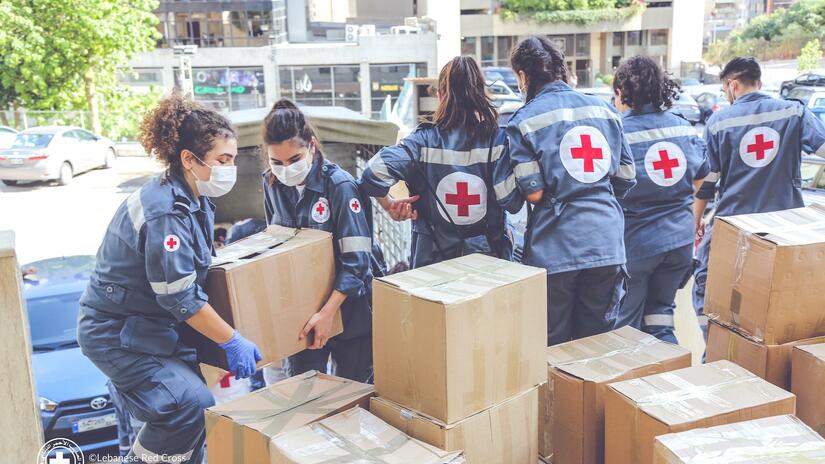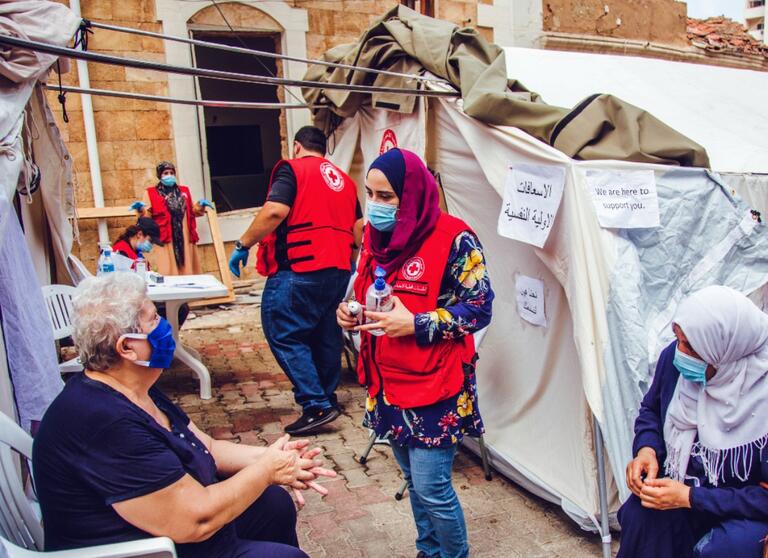Beirut/Geneva, 4 August 2021 - One year on from the devastating Beirut port explosion, the number of people in need of humanitarian assistance in Lebanon continues to rise, due to the severe economic crisis and the devaluation of the local currency, amid the ongoing COVID-19 pandemic. The International Federation of Red Cross Red Crescent Societies (IFRC) continues to support the Lebanese Red Cross (LRC) with life-saving activities, reaching millions of people throughout the country.
For many people who have lost their jobs and the ability to buy basic food and household goods, it has become extremely difficult to buy medicines and to access healthcare.
George Kettaneh, Secretary General of the Lebanese Red Cross, said:
“The severe economic crisis that our country is facing is shattering the lives of many people in Lebanon. People suffering from chronic diseases can’t wait until the economic crisis is over. They need our help now to secure basic necessities, such as food and medicine."
“We are calling on the generosity of donors to help us sustain our vital public services and to fund our response to the economic crisis."
Since the blast in August last year, IFRC has closely supported LRC in meeting the humanitarian needs of those affected. Specifically, IFRC has supported LRC by mobilizing resources for the emergency response and released 750,000 Swiss francs of its Disaster Relief Emergency Fund (DREF) in the initial days following the explosion. Later, IFRC launched a 20 million Swiss francs global emergency appeal with the aim to assist more than 105,000 people. In addition, IFRC deployed specialized staff, supporting and complementing LRC’s efforts in multiple sectors; and provided financial support to ensure the continuity of LRC’s daily operations in delivering vital services to vulnerable people.
Cristhian Cortez, IFRC Representative in Lebanon, said:
“The IFRC and the Lebanese Red Cross are working together to extend their operations, which include emergency and primary health care, COVID-19 support, and scaling up of blood transfusion services from 42,000 to 60,000 units per year to meet the basic needs of people in Lebanon”.
To date, the IFRC has raised 9.2 million Swiss francs through its global appeal. The Lebanese Red Cross has supported more than 10,800 families with direct cash assistance – comprising seven payments of 300 US dollars each per household – for a total amount of 22.8 million US dollars.
Right now, the priority of the Lebanese Red Cross is to sustain its vital emergency health and ambulances services, which are provided for free to the population and to respond to the surge in demand related to the COVID-19 pandemic. It also seeks to find ways to alleviate the suffering resulting from the severe economic crisis. According to the World Bank, as of June 2021, more than 45% of the Lebanese population is now living under the poverty line.
About Lebanese Red Cross
- Lebanese Red Cross (LRC) is the main national provider of ambulance and blood transfusion services in Lebanon. Every year, LRC provides free services to more than 180,000 people across the country. Following the Beirut port explosion and in a context of crumbling public services, LRC has been striving to maintain life-saving operations throughout the country.
- LRC operates a network of 36 primary health centers, 9 mobile clinics and 2 COVID-19 vaccination centres in Lebanon and is currently scaling up those services to be able to better respond to the shortage of medicines and decreased access of the population to healthcare.
- Volunteers and staff from LRC conducted more than 35,000 assessments to identify the households that were most in need of assistance. The families were selected based on specific vulnerability criteria, such as difficulties in meeting the most urgent needs; special needs; families with damaged or destroyed apartments; people with injuries and problems in accessing healthcare and/or buy medicines; single female-headed households; and age considerations.
For more information or to arrange an interview, contact:
In Beirut: Rana Sidani Cassou, [email protected], +961 71 802 779
In Geneva: Nathalie Perroud, [email protected], +41 79 538 14 71





